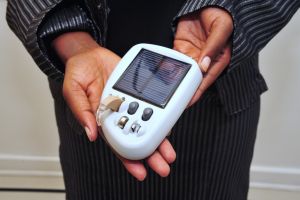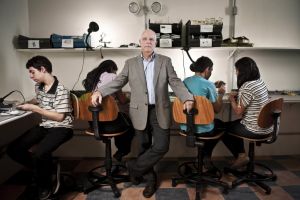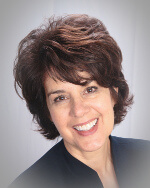|
www.HealthyHearing.com |
Low-cost solar-powered hearing aids fill a need in developing countries
Contributed by Debbie Clason, staff writer, Healthy Hearing Howard Weinstein will tell you he has two daughters named Sarah, both born on the same day of the same year a world apart. One would die unexpectedly from a brain aneurysm during the night when she was only 10 years old. He would meet the other years later, a deaf girl living in Botswana who would be instrumental in helping him co-found Solar Ear, a social business that not only provides low-cost, solar rechargeable hearing solutions to underserved countries all over the world, but also empowers their deaf and hard-of-hearing communities. 
that's powered by solar energy. “That was the whole reason I went to Botswana,” he said, “to give meaning to my daughter’s death. In retrospect, it gave meaning to my life.” About Solar Ear and solar hearing aidsWeinstein, a plumber by trade, met Sarah and her mother on his first day as a World University Service of Canada volunteer in Otse, a rural town in Botswana. Sarah needed a hearing aid, but Weinstein knew nothing about them. The following week, he traveled to Sarah’s school for the deaf with a translator to ask the students about their “hopes and dreams.” The students told him that in Africa, being deaf is considered a curse from God. They said while some wore hearing aids they received from local charities, others didn’t own them. Those who did have hearing aids said they either couldn’t afford the batteries or weren’t able to travel the distance necessary to acquire them. They told him that jobs are scarce for women in Botswana, especially for those who are deaf or disabled. “I said ‘let’s start a business. Let’s make a low-cost, rechargeable hearing aid. Let’s hire and empower women who are deaf’,” Weinstein said. “I basically wrote the hopes and dreams of 10 young people who were deaf into a business plan.” After securing a $250,000 grant from the African Development Foundation, sponsored by the United States Congress, Godisa Technologies, a precursor to Solar Ear, was born. The students worked alongside South African engineers who were interested in the project to harness the free power of the sun and invent the first solar charger. Within a year the students were gainfully employed selling their solar chargers, hearing aids and batteries. That was in 2002. In 2019, Solar Ear sold 50,000 hearing aids, 100,000 solar chargers and 250,000 batteries. The batteries sell for $1, last for three years and can be used in almost any hearing aid. Weinstein estimates Solar Ear products prevent as many as 200 million batteries from being discarded each year. “It was an amazing experience,” he said of the startup process. “I can’t even screw in a light bulb. The students invented the products. When we opened up in other countries, they became the teachers. They showed me that in life everything is possible.” A social business modelAlthough the financial success of the business is rewarding, Weinstein believes the empowerment part of Solar Ear’s mission is just as important. One third of the profits are invested back into the business, one third is invested into the social mission of the company and one third is invested into the empowerment of the deaf and disabled workers they employ. He likens Solar Ear’s social business model to a “three-dimensional game of Tic-Tac-Toe." 
Level One looks like a traditional business model with marketing, sales, administration, customer service, product design, manufacturing, shipping and finance. Level Two includes the social mission of the organization. At Solar Ear, the center square is education. “There are very few schools for the deaf in developing countries,” Weinstein said, “and it’s only through education can you break that cycle of poverty." Solar Ear students have become the teachers in the deaf community. In Botswana they invested some of their profits in a HIV/AIDS education program for people who are deaf. It effectively lowered the incidence of the disease from 38% to 10%. In Brazil, they invested in free voice, language and speech therapy to the children. In the Middle East, deaf Muslims, Christians and Jewish people are working together on peace-building missions. Level Three is empowerment of the workers. “They come in lacking confidence and communication skills,” Weinstein said. “A company only grows as quick as its people grow so one day a week we work on projects that empower them as a person.” For example, when the students encountered a communication problem with tellers at the bank, they solved it by offering to teach bank employees sign language and developed a sign language Pictionary. When it was time to expand operations, three of the Botswana students traveled by themselves to Brazil to open a Solar Ear operation in that country. Solar Ear operations expand globallyBy all accounts, the social business model is working. The Solar Ear model has been scaled and replicated successfully in Brazil and China. This year, they will open operations in Russia, Canada and Israel. Each Solar Ear operation is independently owned and operated. Today Sarah is president of the Botswana operation. “Look at what Sarah and the kids who are deaf in rural Botswana have accomplished,” Weinstein said. “They have traveled the world. Their products are displayed at the Smithsonian Museum. National Geographic included them in an article. Most of us haven’t accomplished 1/10 of what they’ve accomplished in their life. It’s shown me that everything is possible.” Smartphones are a 'game-changer'With World Health Organization (WHO) projections of hearing loss numbers surpassing 900 million in the next 30 years, Weinstein expanded the Solar Ear mission to include the fight against hearing loss. Armed with information he acquired during 18 months of researching best practices from hearing experts around the world, he developed the DREET model (detection, research, education, equipment and therapy) and changed the solar operation in Brazil into a DREET center. Solar Ear intends to take the DREET model public by using smartphone app technology and empowering deaf entrepreneurs. A pilot of their otoscopy app is complete and a mini-pilot of the pure-tone test is currently underway. The OAE hearing screening app will be ready by the end of the year. “The smartphone is the game changer,” Weinstein said. “It has now made hearing health affordable and accessible to everybody. The plan is to have all apps free for developing countries. To be sustainable, we will generate income by selling ads on the apps.” (Even more impressive? Smartphones can also be charged with Solar Ear's solar charger.) How to help Solar Ear's missionThose interested in helping Solar Ear’s mission of lowering hearing loss through the use of innovative appropriate technologies can donate through PayPal, designating the funds for the country or social project of their choice. “In a way, I do my work for the Sarahs of the world—my Sarah and my Botswana Sarah,” Weinstein said. “Our goal is to hire and empower as many people who are deaf as possible and get as many low-cost hearing devices to the children of the world.” Debbie Clason, staff writer, Healthy Hearing
|
Featured clinics near me
Earzlink Hearing Care - Reynoldsburg
7668 Slate Ridge Blvd
Reynoldsburg, OH 43068

Find a clinic
We have more hearing clinic reviews than any other site!


 Debbie Clason holds a master's degree from Indiana University. Her impressive client list includes financial institutions, real estate developers, physicians, pharmacists and nonprofit organizations.
Debbie Clason holds a master's degree from Indiana University. Her impressive client list includes financial institutions, real estate developers, physicians, pharmacists and nonprofit organizations.